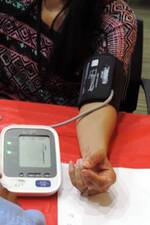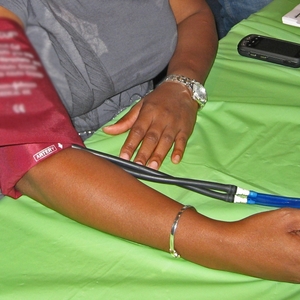Author Interviews, Blood Pressure - Hypertension / 06.02.2024
Understanding and Managing Your Blood Pressure: A Guide for Patients
People need to be able to control their blood pressure if they want to live a healthy life. In this guide, we will supply you with practical information and easy tips to maintain your blood pressure. As a matter of fact, you don’t need to be a medical professional, we will simplify it for you. Whether you are already embarking on your blood pressure quest or searching for a better way of achieving it, this guide is your partner. So, let's get started!
 It is your lifestyle that determines your blood pressure levels. Your nutritional intake and the level of activity have a significant part as well.
First, monitor what you eat. Try to have your daily intake equally distributed among fruits, vegetables, whole grain and lean proteins. Cutting back on salty food can also do great magic.
In terms of physical activity, even minor adjustments can yield significant results. Moreover, a consistent practice of physical activity, such as brisk walking or swimming, may lower your blood pressure over a period of time. Remember, you don’t have to run a marathon – being dedicated is what you should focus on doing.
With these modifications, you are moving proactively towards normalized blood pressure levels.
(more…)
It is your lifestyle that determines your blood pressure levels. Your nutritional intake and the level of activity have a significant part as well.
First, monitor what you eat. Try to have your daily intake equally distributed among fruits, vegetables, whole grain and lean proteins. Cutting back on salty food can also do great magic.
In terms of physical activity, even minor adjustments can yield significant results. Moreover, a consistent practice of physical activity, such as brisk walking or swimming, may lower your blood pressure over a period of time. Remember, you don’t have to run a marathon – being dedicated is what you should focus on doing.
With these modifications, you are moving proactively towards normalized blood pressure levels.
(more…)
What is Blood Pressure?
Basically, blood pressure is the force that your blood applies throughout your arteries. It guarantees that the blood and oxygen go to tissues and organs of the body without any issues. To control it efficiently, the preliminary step is in its understanding. Not to worry – you do not need to be a medical genius to understand this concept. After you become familiar with this, we shall look into how to manage the same in healthy ways.The Impact of Your Lifestyle
 It is your lifestyle that determines your blood pressure levels. Your nutritional intake and the level of activity have a significant part as well.
First, monitor what you eat. Try to have your daily intake equally distributed among fruits, vegetables, whole grain and lean proteins. Cutting back on salty food can also do great magic.
In terms of physical activity, even minor adjustments can yield significant results. Moreover, a consistent practice of physical activity, such as brisk walking or swimming, may lower your blood pressure over a period of time. Remember, you don’t have to run a marathon – being dedicated is what you should focus on doing.
With these modifications, you are moving proactively towards normalized blood pressure levels.
(more…)
It is your lifestyle that determines your blood pressure levels. Your nutritional intake and the level of activity have a significant part as well.
First, monitor what you eat. Try to have your daily intake equally distributed among fruits, vegetables, whole grain and lean proteins. Cutting back on salty food can also do great magic.
In terms of physical activity, even minor adjustments can yield significant results. Moreover, a consistent practice of physical activity, such as brisk walking or swimming, may lower your blood pressure over a period of time. Remember, you don’t have to run a marathon – being dedicated is what you should focus on doing.
With these modifications, you are moving proactively towards normalized blood pressure levels.
(more…)


 Esa M. Davis, M.D., M.P.H , F.A.A.F.P
Professor of Medicine and Family and Community Medicine
Associate Vice President of Community Health and
Senior Associate Dean of pPopulation Health and Community Medicine
University of Maryland School of Medicine
Dr. Davis joined the U.S. Preventive Services Task Force in January 2021
MedicalResearch.com: What is the background for this study?
Response: Hypertensive disorders of pregnancy, including gestational hypertension, preeclampsia, and eclampsia, are among the leading causes of serious complications and death for pregnant people in the United States.
Pregnant women and pregnant people of all genders should have their blood pressure measured at each prenatal visit to help find and prevent serious health issues related to hypertensive disorders of pregnancy.
Esa M. Davis, M.D., M.P.H , F.A.A.F.P
Professor of Medicine and Family and Community Medicine
Associate Vice President of Community Health and
Senior Associate Dean of pPopulation Health and Community Medicine
University of Maryland School of Medicine
Dr. Davis joined the U.S. Preventive Services Task Force in January 2021
MedicalResearch.com: What is the background for this study?
Response: Hypertensive disorders of pregnancy, including gestational hypertension, preeclampsia, and eclampsia, are among the leading causes of serious complications and death for pregnant people in the United States.
Pregnant women and pregnant people of all genders should have their blood pressure measured at each prenatal visit to help find and prevent serious health issues related to hypertensive disorders of pregnancy. 











 Kathryn Foti, PhD, MPH
Postdoctoral fellow
Department of Epidemiology
Johns Hopkins Bloomberg School of Public Health
MedicalResearch.com: What is the background for this study?
Response: The Kidney Disease: Improving Global Outcomes (KDIGO) 2021 Clinical Practice Guideline for the Management of Blood Pressure (BP) in Chronic Kidney Disease (CKD) provides recommendations for the management of BP in individuals with nondialysis CKD, incorporating new evidence since the publication of its previous guideline in 2012.
The 2021 KDIGO guideline recommends a target systolic BP <120 mmHg based on standardized office BP measurement. This BP goal is largely informed by the findings of the SPRINT trial which found targeting SBP <120 mmHg compared with <140 mmHg reduced the risk of cardiovascular disease by 25% and all-cause mortality by 27%. The benefits were similar for participants with and without CKD.
In our study, we sought to examine the potential implications of the 2021 KDIGO guideline for BP lowering among US adults with CKD compared to the 2012 KDIGO guideline (target BP ≤130/80 mmHg in adults with albuminuria or ≤140/90 mmHg or under without albuminuria) and the 2017 American College of Cardiology/American Heart Association (target BP <130/80 mmHg) guideline. Additionally, we determined implications of the 2021 KDIGO guideline for angiotensin converting enzyme inhibitor (ACEi) or angiotensin II-receptor blocker (ARB) use for those with albuminuria (recommended at systolic BP ≥120 mmHg) compared to the 2012 KDIGO guideline (recommended at BP >130/80 mmHg).
Kathryn Foti, PhD, MPH
Postdoctoral fellow
Department of Epidemiology
Johns Hopkins Bloomberg School of Public Health
MedicalResearch.com: What is the background for this study?
Response: The Kidney Disease: Improving Global Outcomes (KDIGO) 2021 Clinical Practice Guideline for the Management of Blood Pressure (BP) in Chronic Kidney Disease (CKD) provides recommendations for the management of BP in individuals with nondialysis CKD, incorporating new evidence since the publication of its previous guideline in 2012.
The 2021 KDIGO guideline recommends a target systolic BP <120 mmHg based on standardized office BP measurement. This BP goal is largely informed by the findings of the SPRINT trial which found targeting SBP <120 mmHg compared with <140 mmHg reduced the risk of cardiovascular disease by 25% and all-cause mortality by 27%. The benefits were similar for participants with and without CKD.
In our study, we sought to examine the potential implications of the 2021 KDIGO guideline for BP lowering among US adults with CKD compared to the 2012 KDIGO guideline (target BP ≤130/80 mmHg in adults with albuminuria or ≤140/90 mmHg or under without albuminuria) and the 2017 American College of Cardiology/American Heart Association (target BP <130/80 mmHg) guideline. Additionally, we determined implications of the 2021 KDIGO guideline for angiotensin converting enzyme inhibitor (ACEi) or angiotensin II-receptor blocker (ARB) use for those with albuminuria (recommended at systolic BP ≥120 mmHg) compared to the 2012 KDIGO guideline (recommended at BP >130/80 mmHg). 






